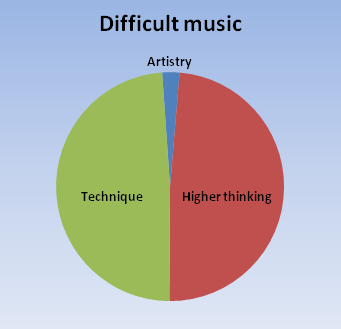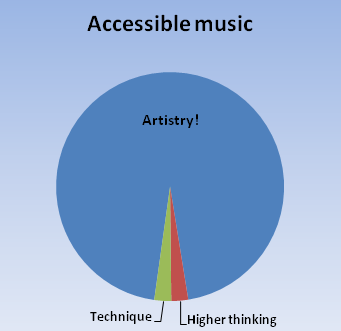
Time and again, when I hear students audition, some will attempt to perform music that’s beyond their capacities.
“This’ll be impressive,” they surmise, as they struggle through one phrase after another.
Such students seldom realize that their misguided choices of repertoire don’t just fail to impress but also hamper their progress. Here are three reasons why:
Why Overly Difficult Music Hampers Progress
- If students are habitually overwhelmed by technical challenges, they ingrain habits of tension that limit their fluency and increase the likelihood of injury.
- When musicians tackle compositions that are beyond their reach, they rely on rote, mindless learning strategies that lead to frustration and performance anxiety.
- Students who fumble through unattainable music acquire imprecise habits – their timing, intonation, tone, and so forth perpetually sound ragged. In the end, they miss out on learning how to shape exquisite phrases and present compelling performances.
Appropriate Challenges
Some of you might be thinking, “Doesn’t challenging repertoire motivate students and extend their skills? Isn’t it essential to musical development?”
Let me be clear: appropriate challenges inspire and educate; excessive ones don’t.
As I explain in The Musician’s Way, challenging exercises and etudes are ideal for stretching students’ technical skills.
But when it comes to choosing repertoire for auditions and concerts, only accessible material enables students to acquire the habits of mastery that beget secure, artistic performances.
Difficult vs. Accessible Music
As an illustration, let’s consider the differing demands that hard versus accessible music place on musicians’ artistic, technical, and higher thinking abilities (we use higher thinking skills to direct and evaluate our execution).
When students take on overly difficult music, they toil to get the notes. Then, the overload on their technical and higher thinking powers obstructs their ability to express themselves:

Overly difficult music obstructs artistic expression
With accessible repertoire – i.e., music that can be mastered in a day to a week – the technical and higher thinking requirements fall well within students’ grasp, so they have ample capacity to perform artistically:

Accessible music promotes artistic expression
Accessible Repertoire & Artistic Development
Accessible repertoire makes it possible for rising musicians to become true performing artists. It leaves them with the mental and physical space they need to build performance skills and develop their interpretive voices.
What’s more, by assembling large caches of accessible pieces, students are able to perform without needing to practice at length, allowing them to appear in public frequently and steadily improve their performance skills.
At that point, with the fundamentals in place needed to successfully practice, interpret and perform music, students can confidently tackle tougher repertoire.
Topics of practice and performance are discussed at length in The Musician’s Way; matters of repertoire choice are explored in “Choosing New Material” (p. 14-16).
Related posts
Clear goals, clear process
Deep practice
Mental imaging
Practicing performance
Self-evaluation: the key to artful practice
© 2009 Gerald Klickstein
Photo licensed from Shutterstock


You’re welcome, Terry. Thanks for stopping by & for the supportive words!
Thanks Gerald. This is the clearest explanation of why one shouldn’t overreach in choosing one’s repertoire that I’ve seen. Thanks!
Gerald, I love this post, and absolutely concur. Artistry is a poor second cousin to note naming for many a student, and it’s no wonder that their performances are strained and their motivation intermittent. Learning repertoire that is within the technical capacity of the student allows them to develop the vitally important communication skills that artistry encompasses. Love it.
Wonderful story, Laura – thanks for sharing. And congratulations on a successful concert!
So, so true. I just finished playing a solo concert-gig last week after having played primarily in various duo ensembles for the past 3 years with solo pieces intermixed from time to time. In getting prepared, I had just finished a new arrangement of a celtic piece and really wanted it to be performance ready by the time of this concert-gig. I viewed it as a challange to get it stage ready as well as debut it with my own re-debut as a soloist. I kept faltering in my practise performance times when this piece was included in the programming, but was determined to overcome the obstacles…I finally decided to just set it aside to perform at another time when it truely was ready to perform and the minute I let it go, the other pieces I had programmed (all “accessible pieces”) flowed well with not a trace of tension or “fear”….I am so glad I didn’t stubbornly hold onto performing it prematurely! The re-debut concert-gig was truely a great success as well as a personal best for me. Yippee!